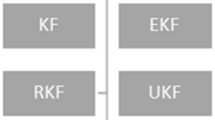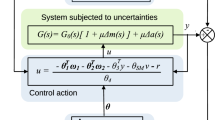Abstract
This study proposes two improved gradient descent parameter estimation algorithms for rational state-space models with time-delay. These two algorithms, based on intelligent search method and momentum method, can simultaneously estimate the time-delay and parameters without the matrix eigenvalue calculation in each iteration. Compared with the traditional gradient descent algorithm, the improved algorithms come with two advantages: having quicker convergence rates and less computational efforts, particularly meaningful for those large-scale systems. A simulated example is selected to illustrate the efficiency of the proposed algorithms.





Similar content being viewed by others
References
Zhang, X., Yang, E.F.: State estimation for bilinear systems through minimizing the covariance matrix of the state estimation errors. Int. J. Adapt. Control Signal Process. 33(7), 1157–1173 (2019)
Zhang, X., Ding, F.: Hierarchical parameter and state estimation for bilinear systems. Int. J. Syst. Sci. 51(2), 275–290 (2020)
Ding, F., Liu, X.P., Liu, G.: Identification methods for Hammerstein nonlinear systems. Digit. Signal Process. 21(2), 215–238 (2011)
Billings, S.A., Zhu, Q.M.: Rational model identification using extended least squares algorithm. Int. J. Control 54(3), 529–546 (1991)
Zhu, Q.M., Wang, Y., Zhao, D., et al.: Review of rational (total) nonlinear dynamic system modelling, identification, and control. Int. J. Syst. Sci. 46(12), 2122–2133 (2015)
Zhu, Q.M., Yu, D.L., Zhao, D.Y.: An enhanced linear Kalman filter (EnLKF) algorithm for parameter estimation of nonlinear rational models. Int. J. Syst. Sci. 48(3), 451–461 (2017)
Chen, J., Zhu, Q.M., Li, J., Liu, Y.J.: Biased compensation recursive least squares-based threshold algorithm for time-delay rational models via redundant rule. Nonlinear Dyn. 91(2), 797–807 (2018)
Kamenski, D.I., Dimitrov, S.D.: Parameter estimation in differential equations by application of rational functions. Comput. Chem. Eng. 17, 643–651 (1993)
Klipp, E., Herwig, R., Kowald, A.: Systems Biology in Practice: Concepts, Implementation and Application. Wiley-VCH, Weinheim (2005)
Geng, X., Zhu, Q., Liu, T., Na, J.: U-model based predictive control for nonlinear processes with input delay. J. Process Control 75, 156–170 (2019)
Li, H.P., Shi, Y., Yan, W.S., Liu, F.Q.: Receding horizon consensus of general linear multi-agent systems with input constraints: an inverse optimality approach. Automatica 91, 10–16 (2018)
Wang, D.Q., Mao, L.: Recasted models based hierarchical extended stochastic gradient method for MIMO nonlinear systems. IET Control Theory Appl. 11(4), 476–485 (2017)
Yu, C.P., Verhaegen, M., Hanson, A.: Subspace identification of local systems in one-dimensional homogeneous networks. IEEE Trans. Autom. Control 63(4), 1126–1131 (2018)
Wang, D.Q., Zhang, S., Gan, M., Qiu, J.L.: A novel EM identification method for Hammerstein systems with missing output data. IEEE Trans. Ind. Inform. 16(4), 2500–2508 (2020)
Wang, D.Q., Li, L.W., Ji, Y., Yan, Y.R.: Model recovery for Hammerstein systems using the auxiliary model based orthogonal matching pursuit method. Appl. Math. Model. 54, 537–550 (2018)
Chen, G.Y., Gan, M., Chen, C.L.P., Li, H.X.: A regularized variable projection algorithm for separable nonlinear least-squares problems. IEEE Trans. Autom. Control 64(2), 526–537 (2019)
Zhu, Q.M.: An implicit least squares algorithm for nonlinear rational model parameter estimation. Appl. Math. Model. 29(7), 673–689 (2005)
Mu, B.Q., Bai, E.W., Zheng, W.X., Zhu, Q.M.: A globally consistent nonlinear least squares estimator for identification of nonlinear rational systems. Automatica 77, 322–335 (2017)
Xu, H., Ding, F., Yang, E.F.: Modeling a nonlinear process using the exponential autoregressive time series model. Nonlinear Dyn. 95, 2079–2092 (2019)
Chen, G.Y., Gan, M.: Generalized exponential autoregressive models for nonlinear time series: stationarity, estimation and applications. Inform. Sci. 438, 46–57 (2018)
Li, M.H., Liu, X.M.: Least-squares-based iterative and gradient-based iterative estimation algorithms for bilinear systems. Nonlinear Dyn. 89(1), 197–211 (2017)
Chen, J., Zhu, Q.M., Liu, Y.J.: Maximum likelihood based identification methods for rational models. Int. J. Syst. Sci. 50(11), 1–13 (2019)
Zhang, X.: Recursive parameter estimation methods and convergence analysis for a special class of nonlinear systems. Int. J. Robust Nonlinear Control 30(4), 1373–1393 (2020)
Ding, F., Lv, L., Pan, J., Wan, X.K., Jin, X.B.: Two-stage gradient-based iterative estimation methods for controlled autoregressive systems using the measurement data. Int. J. Control Autom. Syst. 18(4), 886–896 (2020)
Ding, F., Xu, L., Meng, D.D., et al.: Gradient estimation algorithms for the parameter identification of bilinear systems using the auxiliary model. J. Comput. Appl. Math. (2020). https://doi.org/10.1016/j.cam.2019.112575
Wang, D.Q., Yan, Y.R., Liu, Y.J., Ding, J.H.: Model recovery for Hammerstein systems using the hierarchical orthogonal matching pursuit method. J. Comput. Appl. Math. 345, 135–145 (2019)
Gan, M., Chen, G.Y., Chen, L., Chen, C.L.P.: Term selection for a class of nonlinear separable models. IEEE Trans. Neural Netw. Learn. Syst. 31(2), 445–451 (2020)
Wan, L.J., Ding, F.: Decomposition-gradient-based iterative identification algorithms for multivariable systems using the multi-innovation theory. Circuits Syst. Signal Process. 38, 2971–2991 (2019)
Ma, J.X., Wu, O., Huang, B., et al.: Expectation maximization estimation for a class of input nonlinear state space systems by using the Kalman smoother. Signal Process. 145, 295–303 (2018)
Zhang, X., Alsaadi, F.E., Hayat, T.: Recursive parameter identification of the dynamical models for bilinear state space systems. Nonlinear Dyn. 89(4), 2415–2429 (2017)
Li, J.H., Zheng, W., Gu, J.P., Hua, L.: A recursive identification algorithm for Wiener nonlinear systems with linear state-space subsystem. Circuits Syst. Signal Process. 37(6), 2374–2393 (2018)
Gu, Y., Liu, J., Li, X., et al.: State space model identification of multirate processes with time-delay using the expectation maximization. J. Frankl. Inst. 356(3), 1623–1639 (2019)
Xu, L., Ding, F., et al.: A multi-innovation state and parameter estimation algorithm for a state space system with d-step state-delay. Signal Process. 140, 97–103 (2017)
Ding, F.: Hierarchical multi-innovation stochastic gradient algorithm for Hammerstein nonlinear system modeling. Appl. Math. Model. 37(4), 1694–1704 (2013)
Ding, F., Liu, X.G., Chu, J.: Gradient-based and least-squares-based iterative algorithms for Hammerstein systems using the hierarchical identification principle. IET Control Theory Appl. 7(2), 176–184 (2013)
Xu, L.: The damping iterative parameter identification method for dynamical systems based on the sine signal measurement. Signal Process. 120, 660–667 (2016)
Xu, L.: The parameter estimation algorithms based on the dynamical response measurement data. Adv. Mech. Eng. 9(11), 1–12 (2017)
Kennedy, J., Eberhart, R.C.: Particle swarm optimization. Proc. IEEE Int. Conf. Neural Netw. 4, 1942–1948 (1995)
Xu, L., Chen, L., Xiong, W.L.: Parameter estimation and controller design for dynamic systems from the step responses based on the Newton iteration. Nonlinear Dyn. 79(3), 2155–2163 (2015)
Xu, L., Xiong, W.L., Alsaedi, A., Hayat, T.: Hierarchical parameter estimation for the frequency response based on the dynamical window data. Int. J. Control Autom. Syst. 16(4), 1756–1764 (2018)
Pan, J., Li, W., Zhang, H.P.: Control algorithms of magnetic suspension systems based on the improved double exponential reaching law of sliding mode control. Int. J. Control Autom. Syst. 16(6), 2878–2887 (2018)
Wan, X.K., Li, Y., Xia, C., et al.: A T-wave alternans assessment method based on least squares curve fitting technique. Measurement 86, 93–100 (2016)
Chang, Y.F., Zhai, G.S., Fu, B., Xiong, L.L.: Quadratic stabilization of switched uncertain linear systems: a convex combination approach. IEEE-CAA J. Autom. Sin. 6(5), 1116–1126 (2019)
Geng, L., Xiao, R.B.: Control and backbone identification for the resilient recovery of a supply network utilizing outer synchronization. Appl. Sci. 10(1), 213 (2020)
Tang, L., Liu, G.J., Yang, M., et al.: Joint design and torque feedback experiment of rehabilitation robot. Adv. Mech. Eng. 12, 1–11 (2020)
Zhang, Y., Huang, M.M., Wu, T.Z., Ji, F.: Reconfigurable equilibrium circuit with additional power supply. Int. J. Low Carbon Tech. 15(1), 106–111 (2020)
Wang, L., Liu, H., Dai, L.V., Liu, Y.W.: Novel method for identifying fault location of mixed lines. Energies 11(6), 1529 (2018)
Liu, H., Zou, Q.X., Zhang, Z.P.: Energy disaggregation of appliances consumptions using ham approach. IEEE Access 7, 185977–185990 (2019)
Zhao, X.L., Lin, Z.Y., et al.: Research on automatic generation control with wind power participation based on predictive optimal 2-degree-of-freedom PID strategy for multi-area interconnected power system. Energies 11(12), 3325 (2018)
Acknowledgements
The authors would like to thank the Associate Editor and the anonymous reviewers for their constructive and helpful comments and suggestions to improve the quality of this paper.
Funding
This study was funded by the National Natural Science Foundation of China (No. 61973137) and the Funds of the Science and Technology on Near-Surface Detection Laboratory (No. TCGZ2019A001).
Author information
Authors and Affiliations
Corresponding author
Ethics declarations
Conflict of interest
The authors declare that they have no conflict of interest.
Additional information
Publisher's Note
Springer Nature remains neutral with regard to jurisdictional claims in published maps and institutional affiliations.
This work is supported by the National Natural Science Foundation of China (No. 61973137) and the Funds of the Science and Technology on Near-Surface Detection Laboratory (No. TCGZ2019A001).
Rights and permissions
About this article
Cite this article
Chen, J., Zhu, Q., Hu, M. et al. Improved gradient descent algorithms for time-delay rational state-space systems: intelligent search method and momentum method. Nonlinear Dyn 101, 361–373 (2020). https://doi.org/10.1007/s11071-020-05755-8
Received:
Accepted:
Published:
Issue Date:
DOI: https://doi.org/10.1007/s11071-020-05755-8




